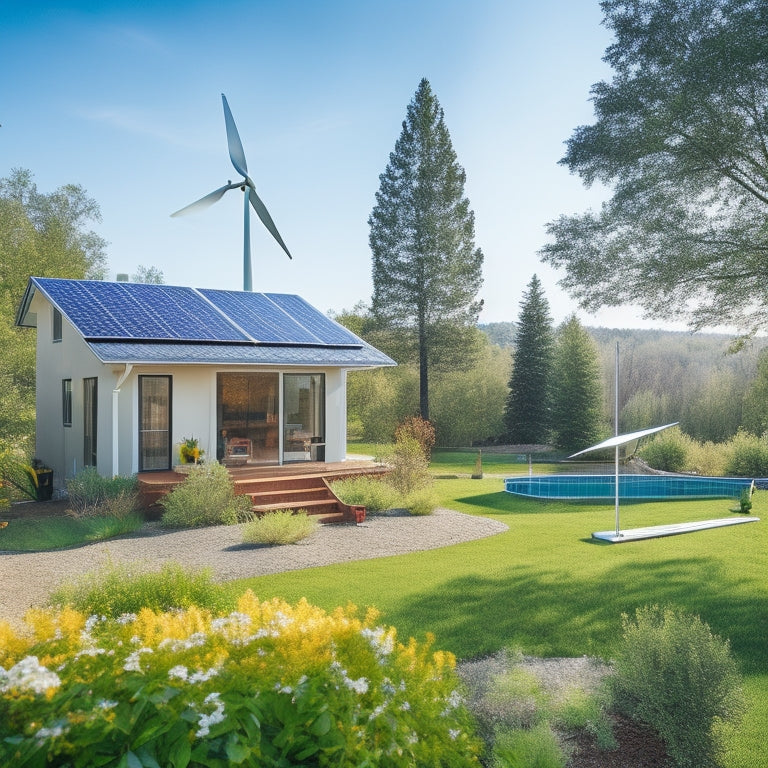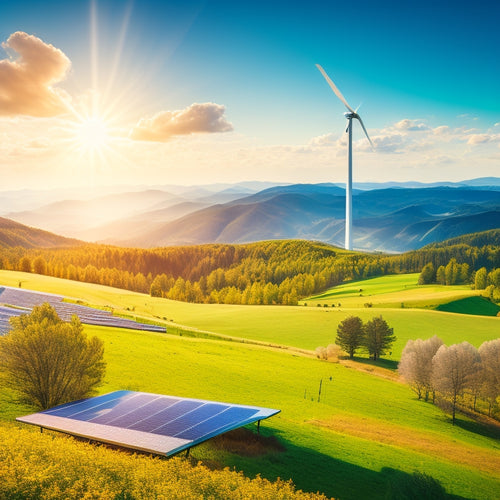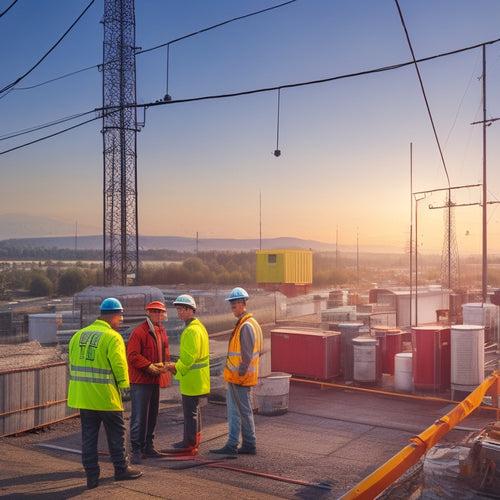
3 Best DIY Renewable Energy Systems Kits Online
Share
You're looking for the best DIY renewable energy systems kits online. Start with top DIY solar panel kits that combine high-efficiency panels, energy storage, and smart management tools. Next, consider off-grid energy systems that pair solar panels with wind turbines, deep-cycle battery banks, and advanced management systems. Finally, explore renewable energy starter packs that provide a cost-effective entry point into DIY renewable energy systems. These kits typically include solar panels, charge controllers, and mounting hardware, making it easy to generate clean energy. As you explore these options, you'll discover the perfect kit to help you reduce your reliance on the grid.
Key Takeaways
• Evaluate DIY renewable energy kits based on energy requirements, available installation space, and budget to ensure the right fit.
• Consider high-efficiency solar panels with monitoring systems for maximum energy output and tracking energy production.
• Off-grid energy systems combining solar, wind, hydro, or biogas power with energy storage and management provide reliable independence from the grid.
• Renewable energy starter packs offer a convenient entry point for beginners, including components like solar panels, charge controllers, and mounting hardware.
• When choosing a DIY kit, prioritize durability, weather resistance, warranty, and maintenance requirements to ensure long-term energy independence.
Top DIY Solar Panel Kits
You can choose from a variety of top DIY solar panel kits that cater to different energy needs and budgets, ranging from small-scale systems for charging small electronics to larger systems for powering entire homes.
When selecting a DIY solar panel kit, consider your energy requirements and the space available for installation. It's crucial to evaluate the panel performance, including the wattage, voltage, and ampere rating, to make sure it meets your energy needs.
Look for kits with high-efficiency panels that provide maximum energy output. Additionally, consider the durability and weather resistance of the panels, as well as the warranty and maintenance requirements.
By choosing the right DIY solar panel kit, you can enjoy significant Solar Savings on your energy bills. Moreover, many kits come with monitoring systems that track your energy production, allowing you to optimize your panel performance and maximize your energy savings.
With the right kit, you can harness the power of the sun and reduce your reliance on the grid.
Best Off Grid Energy Systems
For those seeking independence from the grid, the best off-grid energy systems offer a reliable and sustainable solution, combining solar, wind, hydro, or biogas power generation with energy storage and management systems tailored to specific energy requirements.
You'll find that these systems are designed to provide consistent power, even in remote areas.
When it comes to wind power, you'll want to evaluate wind turbines with high-efficiency blades and durable hubs. Look for systems that include inverters and charge controllers to guarantee seamless integration with your energy storage system. For maximum energy independence, think about pairing your wind turbine with a solar panel array and a deep-cycle battery bank.
When selecting an off-grid energy system, you'll want to assess your energy needs and choose a system that can meet your daily power requirements. Be sure to take into account factors like your location, energy usage, and budget.
With the right system, you can enjoy energy independence and reduce your reliance on the grid.
Renewable Energy Starter Packs
Renewable Energy Starter Packs offer a convenient entry point into DIY renewable energy systems, providing a thorough introduction to harnessing solar, wind, or hydro power for those new to off-grid energy generation. As a renewable beginner, these energy bundles are perfect for getting started with DIY renewable energy projects. They usually include a combination of components, such as solar panels, charge controllers, and mounting hardware, that work together seamlessly.
Here are some benefits of Renewable Energy Starter Packs:
-
Easy to assemble and install: These packs usually come with detailed instructions and are designed for easy setup.
-
Cost-effective: Renewable Energy Starter Packs are often cheaper than buying individual components separately.
-
Customizable: Many packs allow you to choose the type and quantity of components to suit your specific needs.
- Ideal for small-scale energy generation: These packs are perfect for small-scale energy generation, such as powering a small cabin or camping trip.
Frequently Asked Questions
Can I Install a DIY Renewable Energy System Myself?
Coincidentally, you're considering installing a DIY renewable energy system yourself, but can you? It depends on your skill level and adherence to local regulations; if you're handy and compliant, you might just succeed.
How Do I Determine My Energy Needs for a DIY System?
To determine your energy needs for a DIY system, you'll need to conduct an energy audit, which involves performing load calculations to identify your energy usage patterns and pinpoint areas of inefficiency.
Are DIY Renewable Energy Systems Compatible With Grid Power?
You can integrate your DIY renewable energy system with grid power using a grid-tie inverter, allowing you to sell excess energy back to the grid; consider energy storage options to stabilize your power supply.
What Maintenance Is Required for DIY Renewable Energy Systems?
'As you start on your renewable energy journey, you'll need to regularly inspect your batteries, monitor system performance, and optimize energy storage to guarantee seamless operation, all while prioritizing safety checks to avoid potential pitfalls.'
Can I Expand My DIY Renewable Energy System Later?
You can expand your DIY renewable energy system later by considering scalability options during the initial design phase, ensuring system flexibility to accommodate future upgrades and additions as your energy needs evolve.
Related Posts
-

Renewable Energy Solutions to Reduce Your Carbon Footprint
To reduce your carbon footprint, adopting renewable energy solutions is key. Using solar panels or wind turbines can ...
-

Why Outdoor Solar Lighting Systems Are Sustainable
Outdoor solar lighting systems are sustainable because they utilize renewable energy, drastically reducing your carbo...
-

Smart Grid Technology Implementation Challenges
You'll encounter several challenges when implementing smart grid technology, particularly in cost management, scalabi...


